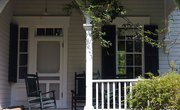Mobile homes are a type of residence that many people in Texas live in. State law gives detailed information about the setup and maintenance of mobile homes, or manufactured housing, as they are called in Texas law. Most of these laws fall under the jurisdiction of the Texas Department of Housing and Community Affairs (TDHCA).
General Laws
Any Texas city is allowed to decide where mobile homes can be built. All mobile homes built in Texas must be approved by the TDHCA and the federal Department of Housing and Urban Development (HUD). Those setting up mobile homes must apply for rights to do so through the branch of the TDHCA in the city where the mobile home will be set up. Mobile homes are also subject to zoning laws in the area in which they are set up.
Forms and Fees
Those setting up a mobile home in Texas must fill out forms and pay fees. A Notice of Installation (Form T) and a $75 reporting fee must be filed with the TDHCA no later than seven days after the installation of a single-section manufactured home is complete. If the home has more than one section, $25 must be added for each additional section. A fee of $35 must be paid to the TDHCA for the required Texas Seal for one manufactured home section, unless a tax assessor-collector or tax appraiser applies for the seal, in which case there is no fee. A fee of $55 is required for a Statement of Ownership and Location. Other inspections may be required, with fees ranging from $150 to $300.
Manufacturer Rules
Manufacturers and installers must give the TDHCA detailed descriptions of the processes that will be involved in the setting up of the mobile home. They must specify the location, orientations and capacity of any materials used to stabilize the area on which the home is placed. All aspects of design must be approved by the manufacturer's Design Approval Primary Inspection Agency with all required stamps. All installers must be licensed under the proper Texas authorities. All building equipment and materials used must be in accordance with the International Residential Code.
Other Laws
Installers must follow the proper rules for site preparation, including any necessary clearance of debris or natural growth and the addition of any drainage. Installers must also consider the Frost Line Zone, areas where winter weather may cause building hazards, in the location where the home is being placed. Installers must follow all rules for moisture and ground vapor control, footer and piers, and anchoring systems.
References
Writer Bio
Jeremy Cato is a writer from Atlanta who graduated with Phi Beta Kappa honors and an English degree from Morehouse College. An avid artist and hobbyist, he began professionally writing in 2011, specializing in crafts-related articles for various websites.

